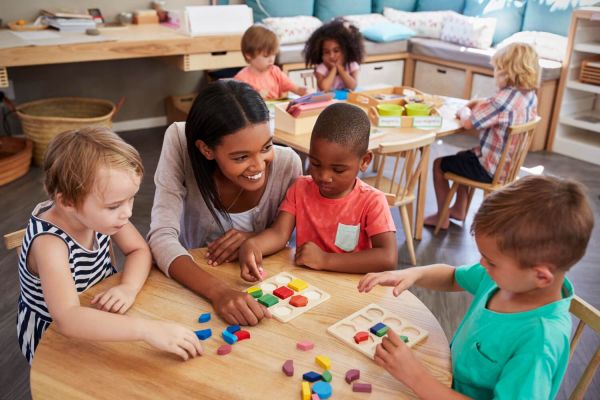
What Is the EYFS Statutory Framework?
As a parent, you want the very best start in life for your child. In England, all nurseries, preschools, childminders, and reception classes follow the Early Years Foundation Stage (EYFS) Statutory Framework. But what exactly does that mean for your little one?
Put simply, the EYFS sets the standards for the learning, development, and care of children from birth to five years old. It’s there to make sure that, wherever your child goes for early education, they receive the same high-quality support to help them grow, learn, and thrive.
What Is the EYFS Statutory Framework?
The EYFS was created by the Department for Education (DfE) and applies to all Ofsted-registered early years providers in England. It ensures that:
- Every child has the best possible start in life.
- Children are cared for in safe, supportive, and stimulating environments.
- Learning is tailored to each child’s individual needs and stage of development.
- Parents can feel confident about the quality of care their child is receiving.
At the end of Reception, the EYFS also guides teachers when completing the Early Years Foundation Stage Profile - a way of understanding how ready each child is for the move into Year 1.
The EYFS Principles
The EYFS is built on four guiding principles that shape how children are cared for and taught:
1. Every Child Is Unique
Every child is different, with their own strengths, interests, and pace of learning. The EYFS makes sure these differences are celebrated.
Example: If your child loves dinosaurs, a teacher might use that interest to encourage counting, storytelling, or even artwork.
2. Positive Relationships
Strong, secure relationships with adults and other children are essential for learning and emotional well-being.
Example: A child who feels shy might be paired with a “special buddy” to help them settle in, making friendships feel safe and natural.
3. Enabling Environments
Children learn best in spaces that are engaging, supportive, and full of opportunities to explore and discover.
Example: A well-stocked outdoor play area encourages children to climb, balance, and dig - helping them build physical skills while having fun.
4. Learning and Development
Children develop in different ways and at different rates. The EYFS provides a balanced structure for supporting growth in all areas.
Example: One child may show an early love of books, while another prefers building towers out of blocks - both are learning, just in different ways.
EYFS: The Seven Areas of Learning
The EYFS divides children’s development into seven areas of learning, grouped into prime and specific areas.
The Prime Areas (Foundation Skills, 0-2 Years)
- Communication and Language: Building listening and speaking skills.
Example: Singing nursery rhymes together, having story time, or chatting about what they see outside. - Physical Development: Strengthening movement, coordination, and self-care.
Example: Running, climbing, threading beads, or learning how to put on their own coat. - Personal, Social, and Emotional Development (PSED): Supporting confidence and relationships.
Example: Taking turns during a game, helping tidy up toys, or talking about feelings with a teacher.
The Specific Areas (Building on the Prime Areas, 2-5 Years)
- Literacy: Early reading and writing skills.
Example: Spotting letters in their own name, drawing “squiggles” that turn into early writing, or sharing favourite picture books. - Mathematics: Introducing numbers, patterns, and problem-solving.
Example: Counting how many apples go into the snack bowl, building with blocks, or singing counting songs. - Understanding the World: Learning about people, places, nature, and technology.
Example: Planting seeds and watching them grow, exploring how a tablet works, or celebrating different cultural festivals. - Expressive Arts and Design: Encouraging creativity and imagination.
Example: Dressing up for role play, painting colourful pictures, or banging drums in a music corner.
Together, these areas ensure that your child develops into a well-rounded, curious, and confident learner, ready for school and beyond.
Why the EYFS Matters for You and Your Child
The EYFS isn’t about ticking boxes; it’s about creating the best possible environment for your child to grow. It reassures you that your child is:
- Learning through play and everyday experiences.
- Developing skills for life, such as social, emotional, and academic skills.
- Safe, supported, and encouraged to shine in their own unique way.
With the EYFS framework in place, you can feel confident that your child’s early years are setting them up for a bright and successful future.
Our Approach to the EFYS Framework at Abbey Wood Grange
At Abbey Wood Grange, we deliver the EYFS through our carefully devised curriculum, which is based on our knowledge of the children and our dedication to nurturing every child to thrive.
- Our spacious, well-equipped rooms provide the perfect environment to enable our professional practitioners to get to know every child and create learning opportunities tailored to individual development.
- Our qualified practitioners build lasting bonds with children and their families to ensure a continuity of care, which is pivotal to every child’s development, sense of self-worth, and belonging. (Don’t just take our word for it, see what our parents have to say here)
- Through observations, interactions, and conversations with parents, it allows us to document and share their learning journey through photos and parent evenings.
- Our curriculum, structure, and enabling environment encourage children to be respectful of one another and their environment. By validating feelings and emotions, children feel heard and empowered to make healthy, happy choices.
To find out more about how Abbey Wood Grange works in partnership to nurture every child, contact us today or see our OFSTED report. We’ll be more than happy to answer any questions you may have!